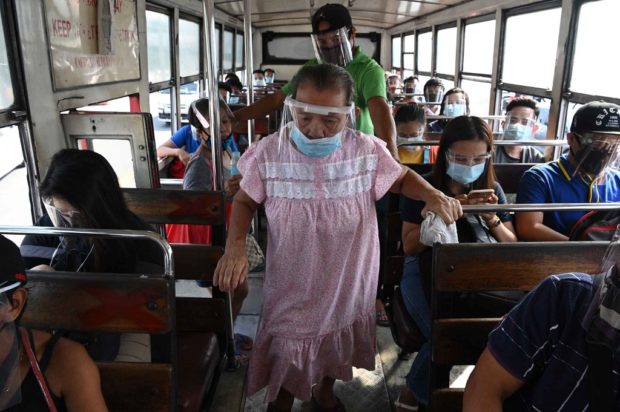Expert favors wearing face shield in enclosed spaces amid Omicron threat

In this photo taken on September 8, 2020, an elderly woman wearing a face shield boards a bus in Manila. – Many face the new normal in the Philippines, where it is now compulsory to wear both face masks and plastic shields in indoor public spaces and on public transport to curb the spread of the COVID-19 coronavirus. (Photo by Ted ALJIBE / AFP)
MANILA, Philippines — Despite the downtrend in the number of infections, an infectious disease specialist said Thursday it is still better to wear face shields in enclosed spaces due to the threat of the new Omicron variant of COVID-19, which experts fear could potentially be highly transmissible and affect the efficacy of vaccines.
Dr. Rontgene Solante, chief of the Adult Infectious Diseases and Tropical Medicine unit of San Lazaro Hospital and member of the Department of Science and Technology’s Vaccine Expert Panel, said that face shields offer a “second layer of protection” especially in enclosed spaces.
“‘Yung sa akin, ang stand ko talaga, mas maganda pa rin na may face shield sa mga enclosed spaces kasi nandoon ‘yung kailangan mo ‘yung second layer of protection,” he told ABS-CBN’s Teleradyo when asked if he thinks the government should reimpose the previous policy on wearing face shields.
(My personal stand on that is it is better to wear a face shield in enclosed spaces because it is where you will need a second layer of protection.)
“Kung gagawing mandatory ‘yan because of the possibility of the Omicron, wala ring problema sa akin ‘yun dahil unang una, that is something that can also protect especially the vulnerable population. ‘Yun naman ang gusto nating maprotektahan. On that note, for me, it’s okay lang,” he added.
Article continues after this advertisement(If you will make it mandatory because of the possibility of the Omicron variant spreading, I don’t have any problem with that because first of all, that is something that can protect especially the vulnerable population. On that note, that is okay for me.)
Article continues after this advertisementThe government earlier lifted the mandatory use of face shields in areas under Alert Levels 1 to 3. According to the Department of Health, there is no need yet to reimpose the use of face shields as COVID-19 transmission remains low despite the threat of the Omicron variant.
The Philippines has yet to detect any case of the B.1.1.529 variant, which was first discovered in South Africa.